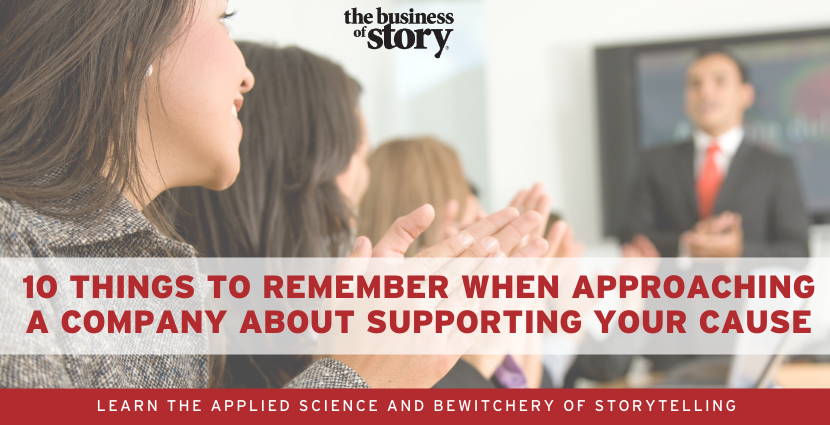 A wise old marketing sage once asked me, “What’s a newspaper in business for?” “To deliver timely, accurate, and impartial news everyday to their subscribers,” I proudly responded as a young ad man trying to impress his mentor. “Wrong,” he said. “Newspapers are in the business to make money! If they’re not making money, they’re not delivering the news,” he snorted. Great point, and an even better lesson.
A wise old marketing sage once asked me, “What’s a newspaper in business for?” “To deliver timely, accurate, and impartial news everyday to their subscribers,” I proudly responded as a young ad man trying to impress his mentor. “Wrong,” he said. “Newspapers are in the business to make money! If they’re not making money, they’re not delivering the news,” he snorted. Great point, and an even better lesson.
The next time you consider asking a for-profit company to sponsor your non-profit cause, first ask yourself the question, “What’s in it for them?” Sure, they want to be a good corporate citizen. That’s a given. What’s really at the crux of the question is how can engagement with you and your organization bump up their bottom line while doing good for the community?
“You must get inside their heads before you can get inside their pockets.”
Acclaimed marketing professors Philip Kotler and Nancy Lee authored an insightful college textbook called, Corporate Social Responsibility, Doing the Most Good for Your Company and Your Cause. This book is filled with best practices on private/public partnerships with companies like The Home Depot, Ben & Jerry’s and Hewlett-Packard. Because it’s written for corporate managers in community relations and corporate giving and marketing, it offers non-profit leaders tremendous insight into how companies choose causes, and how to best align your mission with their mentality.
Here are ten recommendations from the final chapter: A Marketing Approach to Winning Corporate Funding and Support for Social Initiatives.
- Start by developing a list of social issues that your organization or agency is currently charged with supporting and that would benefit from additional resources. Be specific.
- Identify a short list of corporations that these social issues might have a connection with, something that relates to their business mission, products and services, customer base, employee passions, communities where they do business, and/or their corporate giving history.
- Approach corporations and/or their communication agencies and find out more about their interests and experiences relative to supporting social initiatives.
- Listen to their business needs.
- Share with them the social issues your organization supports, the initiatives you are considering or engaged in, and your strengths and resources. Find out which, if any, they find most appealing.
- Prepare and submit a proposal to those corporations most interested in your social issues. Present several optional initiatives for potential support, ones that are the best match for their stated business and marketing needs.
- Participate in developing an implementation plan.
- Offer to handle as much of the administrative legwork as possible.
- Assist in measuring and reporting outcomes.
- Provide recognition for the corporation’s contribution in ways preferred by the company.
If you have thoughts on how to approach companies to support your cause, or a terrific case study you’d like to share, please do so in the comment box below.
This blog originally appeared on Water – Use It Wisely.












at 9:02 am
[…] Our idea of sustainable marketing was featured in Stanford University’s “Social Innovation Review” magazine, and in Philip Kotler’s college textbook, “Corporate Social Responsibility, Doing the most Good for Your Company and Your Cause” […]
at 10:30 am
[…] notable publications include, Philip Kotler’s college textbook, Corporate Social Responsibility, Doing the Most Good for Your Company and Your Cause. Craig Cortello’s “Everything We Needed to Know About Business We Learned Playing […]
at 5:52 pm
[…] notable publications include, Philip Kotler’s college textbook,“Corporate Social Responsibility, Doing the Most Good for Your Company and Your Cause,” […]
at 6:20 am
[…] Good Works! is not about corporate social responsibility. It is a book laden with information for business builders who want to take a more progressive approach – see Conscious Capitalism – to build a brand of meaning. And we’re proud to have our work featured in a second Kotler/Lee social marketing text book. Our first case study appeared in their book, Corporate Social Responsibility, Doing the Most Good for Your Company and Your Cause. […]
at 1:24 pm
[…] Whatever green marketing movement you are trying to gain corporate support for first has to be in alignment with the company’s goals. One of the hardest areas to gain support in is global warming and carbon credits. There is just too much controversy surrounding the science, divide within the issue, and cost associated with correcting it for most corporations to rally behind it. Recycling, water conservation, and other programs that the individuals within a company can easily and actively participate in are the green marketing programs that seem to gain the most traction: 10 considerations when approaching a private company about supporting your public cause. […]
at 3:30 pm
[…] The Water – Use It Wisely campaign has been featured in a host of books and publications, including Fast Company, “Stanford Social Innovation Review,” David Bach’s, “50 Simple Ways To Save The Earth,” and the college marketing textbook, “Corporate Social Responsibility.” […]
at 12:31 pm
[…] a bid to make their conclusions to come off different from the way they are, while also imparting navigate here their own foundation-less opinions in the article. To start us off, it is important for us to ask […]
at 1:33 pm
[…] the Library Guide to citing and referencing and the Q Manual. Also, this reference is inappropriate find more info in an academic context. You should have at least consulted economics, business management or […]